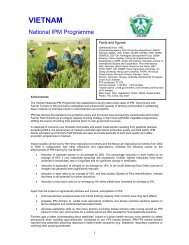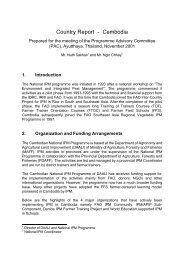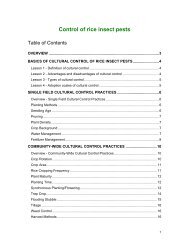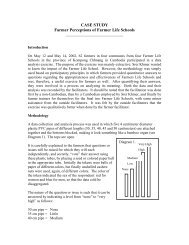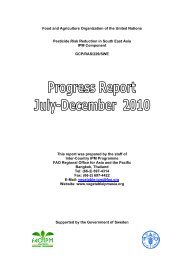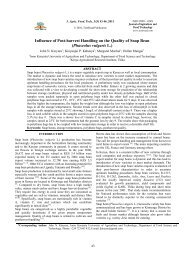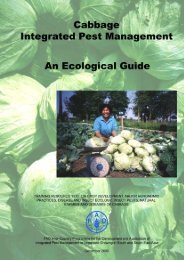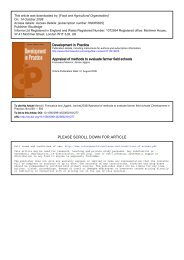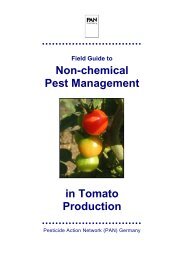Eggplant Integrated Pest Management AN ECOLOGICAL GUIDE
Eggplant Integrated Pest Management AN ECOLOGICAL GUIDE
Eggplant Integrated Pest Management AN ECOLOGICAL GUIDE
Create successful ePaper yourself
Turn your PDF publications into a flip-book with our unique Google optimized e-Paper software.
__________________________________________________________________________________Major <strong>Eggplant</strong> Insect <strong>Pest</strong>s• The egg parasitoid Trichogramma sp. Very good FSB control was obtained with Trichogrammachilonis in Philippines. See box below. Trichogramma sp. was also tested by a farmer in thePhilippines and he reported a 50% control of FSB. No field data are available to confirm this butstudies are being conducted at present (pers.comm. Julieta Lumogdang, 2001).FSB control by Trichogramma chilonis: a success story from PhilippinesDuring a Farmers’ Field School in Negros Occidental (1998/1999) in the Philippines, release ofTrichogramma chilonis at a rate of 10 – 20 cards (containing the parasitoid) per hectare at 5-dayintervals, depending on the infestation, resulted in 60% control of FSB. The first application was done2 weeks after transplanting (pers.comm. Carlito Indencia, 2001).When Trichogramma chilonis was released at fortnightly intervals in a study in Tamil Nadu, India, itsignificantly reduced pest damage and produced fruit yield 20.30 tons, compared with the controlyield of 13.06 tons (Raja, 1998).Trichogramma japonicum was released in eggplant fields in a study in Andhra Pradesh, India, andresulted very good control of shoot and fruit borer as compared to control (Sasikala, 1999).• Eriborus sinicus, another ichneumonid wasp, is a parasitoid of eggplant fruit and shoot borer. In afield study by AVRDC in Taiwan, it was found that this little wasp is a potential natural enemy of FSB.Whether this natural enemy is native to other regions in Asia and how efficient it is as a parasitoid hasyet to be determined.• During a survey for natural enemies of fruit and shoot borer on eggplant in India, Diadegma apostatawas recorded from the pest (Krishnamoorthy, 1998). More research is needed to study the potentialas a natural enemy of FSB.• Reported in India: the larval ectoparasite Bracon sp., found on FSB on eggplant in Karnataka, India.Possibility of its use in the biological control of the pest needs to be further studied (Tewari, 1990).• Use of Bacillus thuringiensis (Bt): In a field experiment in 1995 in Rajasthan, India, treatment with 2ml/liter of Dipel 8 significantly reduced fruit damage caused by FSB compared with the untreatedcontrol (8.78 vs. 12.34%) and produced higher fruit yield than the control (12.07 vs. 9.98 t/ha)(Qureshi, 1998). Other studies however, report that Bt was not effective for FSB control (Patnaik,1997).• There are nematodes that can kill FSB larvae, even those inside shoots and fruits (also see section6.3.4.). Studies done in Bangladesh show that the nematode Steinernema riobravis has goodpotential as biocontrol agent. A solution of nematodes and sticker (to allow the solution to better stickon the plant) is sprayed over the plants. The nematodes land on the eggplant and actively search fora caterpillar. Promising results were obtained with significantly lower FSB infestation in the nematodetreatedplots as compared to the unsprayed plots. However, more research is required before anematode product can be released for commercial use.• Laboratory studies carried out in India showed that larvae of the FSB were moderately susceptible toinfection by the fungus Fusarium moniliforme var. subglutinans. The pathogen did not harm theeggplant crop (Beevi, 1982). Whether this fungus has potential for field control of FSB needs to befurther investigated. In general, fungi that affect insects can contribute to control but this is verydependent on environmental conditions like humidity and temperature. More research is needed toinvestigate the potential for this biocontrol agent.• A baculo virus, a virus that can kill insects, was found connected to FSB in studies in India. Moreresearch is required to study the potential for applying this virus to the field.72<strong>Eggplant</strong> Ecological Guide


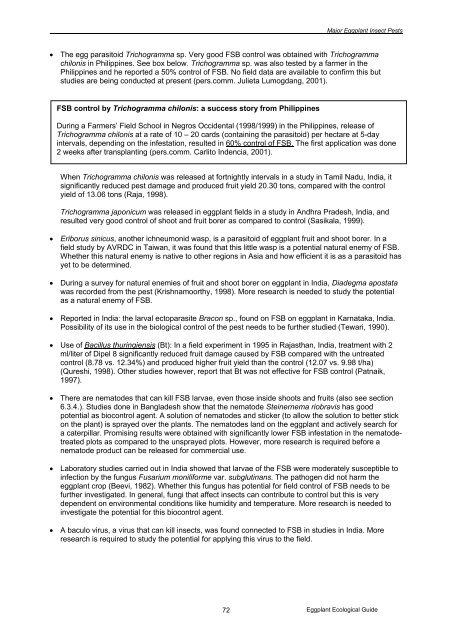
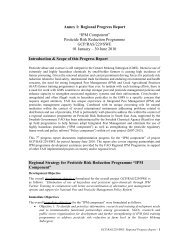
![Section 4 [ PDF file, 252 KB] - The Field Alliance](https://img.yumpu.com/51387260/1/158x260/section-4-pdf-file-252-kb-the-field-alliance.jpg?quality=85)
